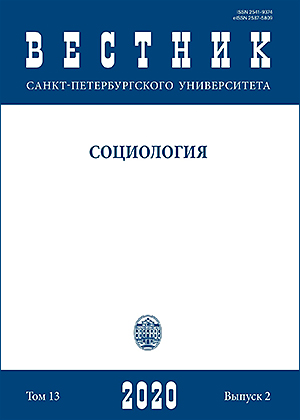The results of an empirical study of cyber-social trust among residents of St. Petersburg
DOI:
https://doi.org/10.21638/spbu12.2020.208Abstract
Trust is an important element in building an information society, however, the increasingly widespread dissemination and use of technology is now accompanied by the influence of negative factors and fears related to the insecurity of certain data transmission channels and much discussed by cyberattacks, government pressure on civilian structures, and also uncertainty about the rules and communication standards of a new type. The article presents the results of an empirical study of the attitude of St. Petersburg residents to the use of digital technologies and identifies the level of trust in the Internet and interpersonal communication. A survey of 600 respondents was conducted in May 2019 (a sample representative of the population of St. Petersburg over 18 years old, the sampling error does not exceed 4 %, the confidence level was 95 %). According to the results, the prevalence of Internet users among the respondents was revealed, as well as an increase in trust in new technologies among younger groups of the population. The article presents the detailed results of the study dedicated to user experience in the field of online learning. The analysis of social inclusion in online learning has also demonstrated the relevance of these technological solutions in the group up to 35 years old. At the same time, assessments of personal experience were divided almost equally into positive and negative between residents of St. Petersburg. Based on the factor model, 3 components were identified that make up the category of cyber-social trust: institutional trust in organizations operating on the Internet; transactional trust in interacting with other online actors (primarily to the state); information trust regarding the completeness, quality and reliability of information (information services).
Keywords:
social trust, trust in information technology, online education, Internet users, opinion, poll
Downloads
References
References
Downloads
Published
How to Cite
Issue
Section
License
Articles of "Vestnik of Saint Petersburg University. Sociology" are open access distributed under the terms of the License Agreement with Saint Petersburg State University, which permits to the authors unrestricted distribution and self-archiving free of charge.




